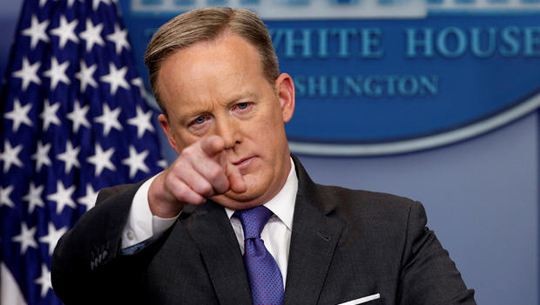Washington, Mar 14: An Indian-American woman confronted White House Press Secretary Sean Spicer at an Apple store and asked him repeatedly how it feels to be working for a "fascist", evoking a 'racist' response from the top US official.

Shree Chauhan, 33, posted a video of Saturday's encounter on Twitter, showing Spicer's reaction as she peppers him with questions that include, "How does it feel to work for a fascist?" and "How do you feel about destroying the country?".
Chauhan also asked Spicer about Russia and accused President Donald Trump of committing treason. In the video that Chauhan put out on social media that has gone viral, Spicer is heard saying that the US is "such a great country that allows you to be here".
Chauhan described his remarks as racist. "That is racism and it is an implied threat. Think about the sheer audacity of Mr Spicer to say that to my face with a smile, knowing that he is being recorded on video and the position of power he holds in our government," she said.
Chauhan described Spicer's response to her question as a threat to her citizenship. "I am still stunned by the boldness of having my citizenship threatened on camera. I was not polite. But when does being impolite mean that I should be thrown out of the United States of America? The country I was born in, the country I was raised in, the country I love despite its flaws," she said.
Spicer told reporters at his daily news conference that the United States is a free country and people have right to act how they want. According to Chauhan, she was in a local Apple store to get her iPhone fixed when she spotted Spicer.
"I realised what an enormous opportunity it was to get answers without the protections normally given to Mr. Spicer. I was honestly quite nervous and wanted to come up with more cogent questions but did not have time to do so," she wrote on a blog post in Medium.
Chauhan said she has lived in Washington DC for about a decade and during this time she has met several VVIPs at public places, including pharmacy and grocery stores, but did not interact with them.
"However, given what Mr. Spicer and his boss are doing to this country, I do not believe they are entitled to these norms and customs. Donald Trump and his Klan are openly trampling on the rule of law, our Constitution and our democracy," she alleged. As per the video, Chauhan also asked Spicer, "Have you helped with the Russia stuff, have you committed treason too, just like the president and what can you tell me about Russia? And how do you feel about destroying our country, Sean?.
Responding to reporters' questions at his daily news conference, Spicer said if people have questions, they should ask him. "Ask it. I interact with individuals all day long. Ninety-nine per cent of them are pleasant, even with people who may not agree with our philosophy or programmes or whatever," he said.





Comments
Add new comment